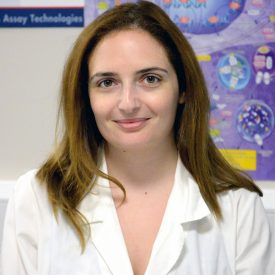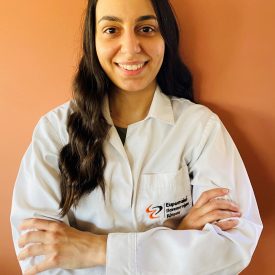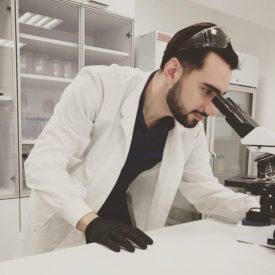Tumor microenvironment, metastasis & experimental therapeutics group
Short Bio:
Dr. Panagiotis Papageorgis is a Professor of Molecular Biology and currently serves as the Vice Rector of Research and External Affairs at European University Cyprus. He received his B.Sc. in Biology from the National and Kapodistrian University of Athens in 2003 and his Ph.D. in Cell and Molecular Biology/Genetics and Genomics from Boston University School of Medicine, USA, in 2009. He has worked as a postdoctoral fellow at the University of Cyprus and as a visiting scholar at Boston University School of Medicine and MGH/Harvard Medical School. He is a member of several professional bodies, including the American and European Associations for Cancer Research, a national representative of the Health configuration in the Horizon Europe program committee and a member of the national committee for the protection of animals used for scientific purposes. He has published over 60 papers in referred journals and 4 book chapters and has more than 5500 citations (Google Scholar, h-index 32, as of 11/2025) and he is included in the list of the top 2% of the world’s scientists every year since 2020, as announced by Stanford University. He is also the recipient of the prestigious “Young Researcher Award” for 2015 from the Cyprus Research Promotion Foundation. He is the Director of the Basic and Translational Cancer Research Center and the Head of the “Tumor Microenvironment, Metastasis and Experimental Therapeutics” research group. His research interests include the elucidation of the molecular events that drive cancer progression at various stages of the metastatic cascade, including dormancy. He is also developing various methodologies, using state-of-the-art humanized pdx animal tumor models coupled with whole-body fluorescence and bioluminescence imaging as well as scRNA sequencing analysis, to decipher the role of tumor microenvironment (TME) components and combinatorial drug treatments to improve the efficacy of cancer immunotherapy in human tumors, such as breast, pancreatic and glioblastoma. He has acquired over 20 research grants from the Research and Innovation Foundation and Horizon Europe, either as a project coordinator or as a partner.
Research focus:
Our research group is interested in deciphering the molecular events that drive metastasis, which is main cause of death for most cancer patients. Using a variety of cellular and molecular biology techniques, mouse models coupled with whole-body animal imaging as well as high-throughput -omics approaches and bioinformatics analyses, the lab focuses on the identification and functional characterization of novel genes implicated in various stages of the metastatic cascade. We are especially interested in understanding the rate-limiting step of this process when disseminated cancer cells escape from dormancy at the metastatic organs. We are also interested in elucidating the roles of the tumor microenvironment (TME), including immune cells, fibroblasts, extracellular matrix (ECM) components and secreted cytokines, like TGFβ, in regulating the metastatic process. Finally, we are developing various therapeutic methodologies, including drug repurposing and combinatorial treatments, to remodel the TME and improve the delivery and efficacy of chemo-, nano- and immunotherapies using 3D cultures, organoids and animal tumor models.
Current Group Members
Past Group Members
Paraskevi Georgiou
Aggelis Nikolaos
Ermi Evdoxiou
Amir Hossein Rezazadeh Moghaddam
Demetris Chasiotis
Avgi Prokopiou
Andri Christofi
Ermina Polyviou
Panayiotis Boutsikos
Fotini Poyia
Demetriou Antri
Farakalla Anthi
Research Grants
Ongoing
“DIDAKTOR”, Research & Innovation Foundation Program, (POST-DOC/0916/0044, 01/01/2019 – 31/12/2021). Role: Project Coordinator. Title: “Unveiling novel molecular mechanisms that regulate colonization of dormant metastatic breast cancer cells”.
“DIDAKTOR”, Research Promotion Foundation’s Program, (POST-DOC/0718/0084, 01/09/2019 – 31/08/2021). Role: Partner. Title: Optimizing immunotherapy in triple-negative breast cancer by normalizing the tumor microenvironment.
“EXCELLENCE HUBS”, Research & Innovation Foundation’s Program, (EXCELLENCE 0421/0179, 01/03/2021 – 28/02/2023). Role: Project Coordinator Title: “Targeting the desmoplastic tumor microenvironment to improve the efficacy of pancreatic cancer immunotherapy”.
“EXCELLENCE HUBS”, Research & Innovation Foundation’s Program, (EXCELLENCE 0421/0342, 01/03/2021 – 28/02/2023). Role: Partner (EUC coordinator). Title “Investigating the mechanistic and therapeutic link between glucose and Histone acetyltransferase 1 (HAT1) activity in the aggressiveness of Glioblastoma multiforme (GBM)”.
“EXCELLENCE HUBS”, Research & Innovation Foundation’s Program, (EXCELLENCE 0421/0152, 01/03/2021 – 28/02/2023). Role: Partner (EUC coordinator). Title “Deciphering the molecular and biological function of histone H2A.X N-terminal acetylation”.
“EXCELLENCE HUBS”, Cyprus Research & Innovation Foundation, (EXCELLENCE 0918/0081, 01/09/2019 – 31/08/2021). Role: Partner, Title: “Function of the histone N-terminal acetyltransferase Naa40 in liver-metabolic reprogramming and oncogenesis”.
“EXCELLENCE HUBS”, Cyprus Research Promotion Foundation, (EXCELLENCE 1216/0036, 01/09/2018 – 31/08/2021), Role: Partner, Title: “Functional and therapeutic implications of histone N-terminal acetyltransferase Naa40 in colorectal oncogenesis”.
“INFRASTRUCTURES” Research Promotion Foundation’s Program (INFRASTRUCTURES/1216/0052, 01/01/2019 – 31/12/2022). Role: Partner, Title: “Center for Preclinical evaluation and optimization of cancer nanomedicine”.
Completed
Completed
“Young Researcher Award”, Cyprus Research Promotion Foundation, (ΚΟΥΛΤΟΥΡΑ/ΒΡ-ΝΕ/0415/03, 01/06/2016 – 31/05/2018). Role: Project Coordinator. Title: “Elucidation of the signaling mechanisms that promote IL13Rα2-mediated breast cancer metastasis”.
“DIDAKTOR”, Research Promotion Foundation’s Program – Co-funded by the European Regional Development Fund and the Republic of Cyprus, (ΔΙΔΑΚΤΩΡ/0609/24, 30/09/2010 – 29/12/2013). Role: Project Coordinator. Title: “Identification and functional characterization of novel genes involved in breast cancer metastasis”.
Selected Publications
- C.M. Neophytou, I. Trougakos, N. Erin and P. Papageorgis. Therapeutic approaches to overcome multi-drug resistance in cancer by targeting apoptotic pathways, Cancers (Basel), 13 (17) 4363 (2021).
- C. M. Neophytou, M. Panagi, T. Stylianopoulos and P. Papageorgis: The Role of Tumor Microenvironment in Cancer Metastasis: Molecular Mechanisms and Therapeutic Opportunities. Cancers (Basel), 13(9) (2021),
- F. Mpekris, M. Panagi, C. Voutouri, J. D. Martin, R. Samuel, S. Takahashi, N. Gotohda, T. Suzuki, P. Papageorgis, P. Demetriou, C. Pierides, L. Koumas, P. Costeas, M. Kojima, G. Ishii, A. Constantinidou, K. Kataoka, H. Cabral and T. Stylianopoulos: Normalizing the Microenvironment Overcomes Vessel Compression and Resistance to Nano-immunotherapy in Breast Cancer Lung Metastasis. Adv Sci (Weinh), 8(3), 2001917 (2021)
- C. K. Wong, A. W. Lambert, S. Ozturk, P. Papageorgis, D. Lopez, N. Shen, Z. Sen, H. M. Abdolmaleky, B. Gyorffy, H. Feng and S. Thiagalingam: Targeting RICTOR Sensitizes SMAD4-Negative Colon Cancer to Irinotecan. Mol Cancer Res, 18(3), 414-423 (2020)
- M. Panagi, C. Voutouri, F. Mpekris, P. Papageorgis, M. R. Martin, J. D. Martin, P. Demetriou, C. Pierides, C. Polydorou, A. Stylianou, M. Louca, L. Koumas, P. Costeas, K. Kataoka, H. Cabral and T. Stylianopoulos: TGF-beta inhibition combined with cytotoxic nanomedicine normalizes triple negative breast cancer microenvironment towards anti-tumor immunity. Theranostics, 10(4), 1910-1922 (2020)
- C. M. Neophytou, C. Pierides, M. I. Christodoulou, P. Costeas, T. C. Kyriakou and P. Papageorgis: The Role of Tumor-Associated Myeloid Cells in Modulating Cancer Therapy. Front Oncol, 10, 899 (2020)
- C. K. Wong, C. Gromisch, S. Ozturk, P. Papageorgis, H. M. Abdolmaleky, B. M. Reinhard, A. Thiagalingam and S. Thiagalingam: MicroRNA-4417 is a tumor suppressor and prognostic biomarker for triple-negative breast cancer. Cancer Biol Ther, 20(8), 1113-1120 (2019)
- C. M. Neophytou, T. C. Kyriakou and P. Papageorgis: Mechanisms of Metastatic Tumor Dormancy and Implications for Cancer Therapy. Int J Mol Sci, 20(24) (2019)
- J. D. Martin, M. Panagi, C. Wang, T. T. Khan, M. R. Martin, C. Voutouri, K. Toh, P. Papageorgis, F. Mpekris, C. Polydorou, G. Ishii, S. Takahashi, N. Gotohda, T. Suzuki, M. E. Wilhelm, V. A. Melo, S. Quader, J. Norimatsu, R. M. Lanning, M. Kojima, M. D. Stuber, T. Stylianopoulos, K. Kataoka and H. Cabral: Dexamethasone Increases Cisplatin-Loaded Nanocarrier Delivery and Efficacy in Metastatic Breast Cancer by Normalizing the Tumor Microenvironment. ACS Nano, 13(6), 6396-6408 (2019)
- M. Kalli, F. Mpekris, C. K. Wong, M. Panagi, S. Ozturk, S. Thiagalingam, T. Stylianopoulos and P. Papageorgis: Activin A Signaling Regulates IL13Ralpha2 Expression to Promote Breast Cancer Metastasis. Front Oncol, 9, 32 (2019)
- C. Demetriadou, D. Pavlou, F. Mpekris, C. Achilleos, T. Stylianopoulos, A. Zaravinos, P. Papageorgis and A. Kirmizis: NAA40 contributes to colorectal cancer growth by controlling PRMT5 expression. Cell Death Dis, 10(3), 236 (2019)
- C. Neophytou, P. Boutsikos and P. Papageorgis: Molecular Mechanisms and Emerging Therapeutic Targets of Triple-Negative Breast Cancer Metastasis. Front Oncol, 8, 31 (2018)
- M. Kalli, P. Papageorgis, V. Gkretsi and T. Stylianopoulos: Solid Stress Facilitates Fibroblasts Activation to Promote Pancreatic Cancer Cell Migration. Ann Biomed Eng, 46(5), 657-669 (2018)
- C. Polydorou, F. Mpekris, P. Papageorgis, C. Voutouri and T. Stylianopoulos: Pirfenidone normalizes the tumor microenvironment to improve chemotherapy. Oncotarget, 8(15), 24506-24517 (2017)
- P. Papageorgis, C. Polydorou, F. Mpekris, C. Voutouri, E. Agathokleous, C. P. Kapnissi-Christodoulou and T. Stylianopoulos: Tranilast-induced stress alleviation in solid tumors improves the efficacy of chemo- and nanotherapeutics in a size-independent manner. Sci Rep, 7, 46140 (2017)
- P. Papageorgis: Complex Interplay Between Aging and Cancer: Role of TGF-beta Signaling. Crit Rev Oncog, 22(3-4), 313-321 (2017)
- F. Mpekris, P. Papageorgis, C. Polydorou, C. Voutouri, M. Kalli, A. P. Pirentis and T. Stylianopoulos: Sonic-hedgehog pathway inhibition normalizes desmoplastic tumor microenvironment to improve chemo- and nanotherapy. J Control Release, 261, 105-112 (2017)
- S. Ozturk, P. Papageorgis, C. K. Wong, A. W. Lambert, H. M. Abdolmaleky, A. Thiagalingam, H. T. Cohen and S. Thiagalingam: SDPR functions as a metastasis suppressor in breast cancer by promoting apoptosis. Proc Natl Acad Sci U S A, 113(3), 638-43 (2016)
- A. W. Lambert, C. K. Wong, S. Ozturk, P. Papageorgis, R. Raghunathan, Y. Alekseyev, A. C. Gower, B. M. Reinhard, H. M. Abdolmaleky and S. Thiagalingam: Tumor Cell-Derived Periostin Regulates Cytokines That Maintain Breast Cancer Stem Cells. Mol Cancer Res, 14(1), 103-13 (2016)
- P. Papageorgis and T. Stylianopoulos: Role of TGFbeta in regulation of the tumor microenvironment and drug delivery (review). Int J Oncol, 46(3), 933-43 (2015)
- P. Papageorgis, S. Ozturk, A. W. Lambert, C. M. Neophytou, A. Tzatsos, C. K. Wong, S. Thiagalingam and A. I. Constantinou: Targeting IL13Ralpha2 activates STAT6-TP63 pathway to suppress breast cancer lung metastasis. Breast Cancer Res, 17, 98 (2015)
- P. Papageorgis: TGFbeta Signaling in Tumor Initiation, Epithelial-to-Mesenchymal Transition, and Metastasis. J Oncol, 2015, 587193 (2015)
- V. Gkretsi, A. Stylianou, P. Papageorgis, C. Polydorou and T. Stylianopoulos: Remodeling Components of the Tumor Microenvironment to Enhance Cancer Therapy. Front Oncol, 5, 214 (2015)
- C. M. Neophytou, C. Constantinou, P. Papageorgis and A. I. Constantinou: D-alpha-tocopheryl polyethylene glycol succinate (TPGS) induces cell cycle arrest and apoptosis selectively in Survivin-overexpressing breast cancer cells. Biochem Pharmacol, 89(1), 31-42 (2014)
- P. Papageorgis, K. Cheng, S. Ozturk, Y. Gong, A. W. Lambert, H. M. Abdolmaleky, J. R. Zhou and S. Thiagalingam: Smad4 inactivation promotes malignancy and drug resistance of colon cancer. Cancer Res, 71(3), 998-1008 (2011)
- P. Papageorgis, A. W. Lambert, S. Ozturk, F. Gao, H. Pan, U. Manne, Y. O. Alekseyev, A. Thiagalingam, H. M. Abdolmaleky, M. Lenburg and S. Thiagalingam: Smad signaling is required to maintain epigenetic silencing during breast cancer progression. Cancer Res, 70(3), 968-78 (2010)
Full list of publications
Collaborators
- Dr. Triantafyllos Stylianopoulos, Associate Professor, University of Cyprus.
- Dr. Antonis Kirmizis, Associate Professor, University of Cyprus.
- Dr. Pavlos Costeas, Director, Karaiskakio Foundation & Center for the Study of Haematological Malignancies.
- Dr. George Lapathitis, Scientist, Cyprus Institute of Neurology and Genetics.
- Dr. Kyriaki Michaelidou, Associate Scientist, Cyprus Institute of Neurology and Genetics.
- Dr. Costas Pitsillides, Cyprus University of Technology & Theramir.
- Dr. Marianna-Prokopi Demetriades, Clinical Associate Professor, European University Cyprus, Cyprus University of Technology & Theramir.
- Mr. Constantinos Loizos, Director, EMBIO Diagnostics.
- Dr. Ourania Tsitsilonis, Professor, National and Kapodistrian University of Athens.
- Dr. Ioannis Trougakos, Professor, National and Kapodistrian University of Athens.
- Dr. Sam Thiagalingam, Associate Professor, Boston University School of Medicine.
- Dr. Alexandros Tzatsos, Associate Professor, George Washington University.















